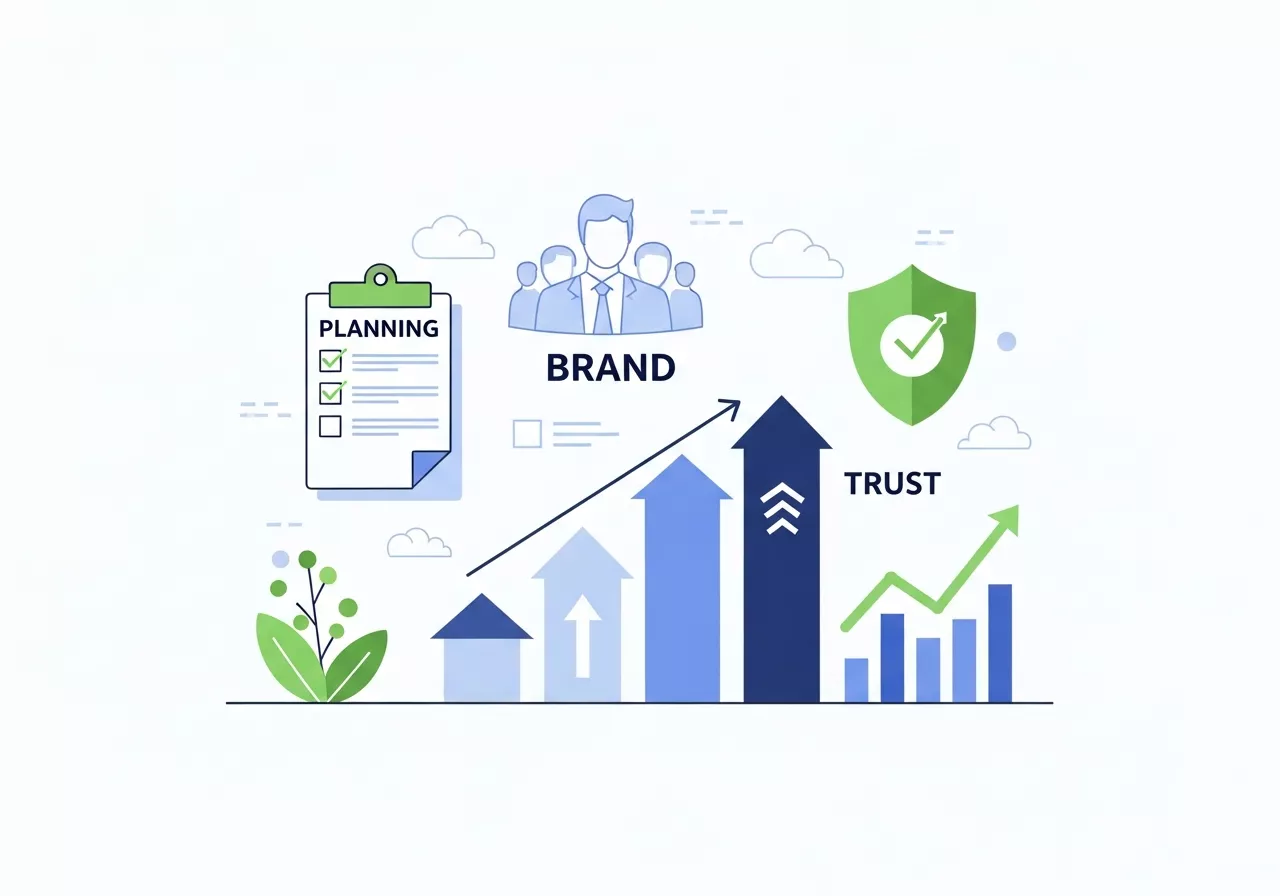Corporate Reputation Management is the strategic practice of shaping, protecting, and enhancing a company’s image. It builds trust, loyalty, and credibility through transparent communication, excellent service, employee advocacy, technology use, and CSR, ensuring long-term growth and resilience.
What is Corporate Reputation Management? It involves an organization managing and shaping of how the organization is understood by its customers and its stakeholders, competitors, and employees and the public as well. Reputation is a company’s greatest asset, affecting customer loyalty and employee satisfaction—and ultimately even financial performance.
What is Corporate Reputation Management in practice? Reputation management is working to build a more positive perception or image and responding to criticisms or addressing crisis situations. Whether by delivering a high standard of customer service, being an honest and forthcoming communicator, or embracing robust ethical practices, corporate reputation management is an imperative to long-term business success.
Why Your Corporate Reputation Matters

Reputation is what people say about you when you’re not in the room. Reputation is something that can take years to establish, but with the level of transparency and speed of digital interaction, today’s audiences demand, it can be broken in mere moments.
1. Builds Trust and Credibility
A positive name and reputation breed confidence in shareholders and clients. People are more likely to purchase from, invest in, or partner with a business they trust. For one, research such as Edelman’s Trust Barometer shows that 81% of consumers feel that trust in a brand is a deal breaker or a deciding factor when making a purchase.
2. Enhances Customer Loyalty
When companies develop a solid reputation, they will keep customers for the long haul. And loyal customers often engage in contagious, positive word-of-mouth, which can make them incredibly powerful brand advocates.
3. Top Talent Elasticities
We also expect that precisely those groups whose top talent is in lower supply will offer more and less of the other group. People like to work for organizations with good reputations. According to a study by Corporate Responsibility Magazine, 92% of job seekers would be willing to leave their current company if offered a position with a more favorable company.
4. Boosts Financial Performance
A reputation for investors and stakeholders is a sign of stability and credibility. Companies with such positive reputations usually find it easier to secure capital and stock market value.
5. Prepares You to Respond to a Crisis
None are immune to setbacks—whether public scandals, product recalls, or social media pile-ons. A good reputation provides your business with a buffer when these problems arise, as people are more willing to forgive a business they view favorably.
The 5 Keys to Corporate Reputation Management
So now that we know how important reputation is, how can businesses actively work to control and enhance their reputations? Here are some essential tips so that you can get started.
1. Monitor Your Online Presence
Because most interactions occur online, on social media, forums, review sites and elsewhere, it is essential to track your digital footprint. Leverage applications such as Google Alerts, Brand24, Hootsuite to monitor your brand mentions and take actions as soon as they are made.
Example: If a customer leaves a negative review on Yelp, a timely and professional response may be enough to right the ship and win over the public’s trust.
2. Communicate Clearly and Openly
Transparency leads to more trust, and businesses that aren’t afraid to show their work, express their ambitions, and share what they’re struggling with will do better with a wider audience. Post about company initiatives. Apologize when appropriate mistakes are made and step in with solutions rapidly.
Example: If there’s a data breach, companies such as Apple will issue clear, timely statements that alert consumers to the problem and detail the response.
3. Offer Excellent Customer Service
Good customer service is one of the simplest means of promoting a favourable image. Educate staff on how to respond to customer inquiries and how to handle complaints appropriately.
Example: Zappos is famous for its customer service. By treating each customer and the back and if it was our property we are able to stay in business for 20 years.
4. Leverage Thought Leadership
Establish your brand as an authority in the industry by serving your audience content that delivers expertise, insight, and innovative solutions. Write Informative Blog Posts, Whitepapers, or Webinars for Establishing Authority In an Online Business.
5. Corporate Social Responsibility (CSR) Achievements and Assistance
There is a growing appreciation for companies that represent more than profit alone. Another is that by getting involved in CSR, such as by participating in sustainable practices or working on community projects, you build a reputation as a company that acts responsibly towards the world and the people in it.
Example: TOMS Shoes itself has established a strong brand by giving away when you buy one pair of shoes, a pair is given to a kid in need, saying not only are we distilling this responsibility, but they are also a business.
Promote Employee Advocacy On a Positive Note

Your employees are your ambassadors of reputation. Happy, motivated staffers are more likely to spread the word about your brand and efforts online and to their friends and family, organically boosting your reputation.
Tip: Give employees opportunities for expansion and praise them publicly for their accomplishments.
Prepare for Crisis Management
No reputation is strong enough that it never has to face challenges. Have a disaster plan in place that includes established lines of communication, contact information, and a game plan to mitigate public outcry.
Example: The crisis management case by Tylenol in 1982 is said to be a textbook case. They were able to restore confidence with their consumers by putting public safety ahead of all else and recalling their products.
Click here:
Creating Corporate Reputation in the Digital Age
Corporations and their reputations in the Internet age bring their own set of opportunities and threats. The rise of social media, online reviews, and the instant news cycle makes your reputation more fragile and more powerful than ever before.
Dealing With Online Challenges
Negative Reviews
Replying to unhappy customers with kindness and consideration is critical. Companies must manage negative reviews promptly and professionally, demonstrating that they value feedback and are committed to resolving issues. By addressing complaints effectively, businesses can turn dissatisfied customers into loyal advocates and protect their brand reputation.
Proactive Social Media Use
Late to the Social Media Game?
Don’t only reply to adverse remarks. When you get positive feedback, thank customers and share user-generated content to create a following.
Highlight Positive Press
Publish your most glowing customer testimonials, awards, or other positive coverage on your website and in social media to further build positive perceptions.
Places to Feature Your Brand
Leverage social media channels, including LinkedIn and Twitter to inspire interest around stories of employees, product breakthroughs, and community programs.
Until eligibility for large public events resumes in your jurisdiction, host online events or Q&As to virtually connect with your followers.
How to Bring Your Corporate Reputation Management to the Next Level

Managing reputation is not only about repair, but it is about building trust, building engagement, and building love for the brand continually. If you’re ready to take action to establish a more durable, resilient reputation, you can begin by assessing where your brand is now.
Action Steps:
- Take stock of what you have online and any holes or deficiencies that you see.
- Educate and train staff about the value of reputation and what they can do to help to build a good one.
- Create and implement a full reputation management plan that is specific to your company.
Businesses that view reputation management as a top strategic goal are typically ahead of the competition in terms of customer loyalty, growth, and weathering the storm during decline.
Leveraging Technology in Corporate Reputation Management

In today’s digital-first world, technology plays a pivotal role in shaping and safeguarding a company’s reputation. Corporate Reputation Management is no longer just a manual task—it involves advanced analytics, AI-driven monitoring, and proactive engagement tools that help organizations stay ahead of potential crises. Leveraging technology allows companies to gather real-time insights into public perception, detect issues early, and optimize communication strategies effectively.
Key Technological Tools for Reputation Management:
- Social Listening Platforms: Tools like Brandwatch and Sprout Social track mentions of your brand across social media, forums, and blogs.
- AI Sentiment Analysis: Artificial intelligence can analyze online sentiment to detect negative trends before they escalate.
- Customer Relationship Management (CRM) Systems: Track customer interactions and feedback systematically to respond promptly.
- Automated Alerts: Set triggers for negative mentions or reviews to enable rapid responses.
- Data Analytics Dashboards: Visualize reputation trends over time to guide strategy.
Table: Comparison of Reputation Management Tools
| Tool Name | Primary Function | Best For | Price Range |
|---|---|---|---|
| Brandwatch | Social Listening & Analytics | Large enterprises | $$$ |
| Hootsuite | Social Media Management | SMBs & Agencies | $$ |
| Sprout Social | Engagement & Monitoring | Multi-channel tracking | $$ |
| Google Alerts | Mentions & Alerts | Small businesses | Free |
| Mention | Reputation Monitoring | Real-time alerts | $-$$$ |
By incorporating these tools into your corporate reputation strategy, your company can quickly identify risks, capitalize on positive feedback, and maintain a consistent, trustworthy image online.
Corporate Reputation Management and Employee Engagement

Employees are not just internal stakeholders—they are the living, breathing ambassadors of your brand. A company’s reputation can rise or fall based on how employees perceive their organization and how they communicate about it externally. Corporate Reputation Management, therefore, must include strategies to engage employees and build an internal culture of pride and responsibility.
Ways to Strengthen Employee-Driven Reputation:
- Internal Communication: Keep employees informed about company goals, achievements, and challenges.
- Recognition Programs: Celebrate employee achievements publicly to reinforce loyalty and advocacy.
- Training and Development: Equip staff with skills to represent the company professionally in public and online spaces.
- Open Feedback Channels: Encourage employees to share concerns and suggestions to prevent internal issues from becoming public crises.
- Culture of Transparency: A transparent culture encourages employees to trust leadership and speak positively about the company externally.
Benefits of Employee Engagement in Reputation Management:
- Increased Brand Advocacy: Motivated employees naturally promote the brand to friends, family, and networks.
- Enhanced Crisis Resilience: Engaged employees help manage crises internally before they escalate.
- Talent Attraction and Retention: Strong employee advocacy enhances the company’s reputation as a desirable workplace.
Measuring the Impact of Corporate Reputation Management
Understanding how your Corporate Reputation Management efforts affect the company is essential. Without measurable indicators, it is impossible to determine whether your strategies are working or require adjustment. By tracking both qualitative and quantitative data, businesses can continuously refine their approach and maximize impact.
Key Metrics to Monitor:
- Brand Sentiment: Positive vs. negative mentions across digital platforms.
- Customer Loyalty Indicators: Repeat purchase rates, subscription renewals, and referral counts.
- Media Coverage: Frequency and tone of press mentions.
- Social Engagement: Likes, shares, comments, and follower growth on social channels.
- Crisis Response Efficiency: Time taken to address complaints or negative incidents.
Example Table: Reputation Metrics Dashboard
| Metric | Measurement Tool | Target Goal |
|---|---|---|
| Brand Sentiment | Social listening platforms | ≥ 80% positive mentions |
| Customer Loyalty | CRM & Surveys | 90%+ repeat purchases |
| Media Coverage | PR Monitoring Tools | 10+ positive articles/month |
| Social Engagement | Social Media Analytics | 5% monthly growth |
| Crisis Response Efficiency | Internal Response Logs | <24 hours response time |
By consistently measuring these metrics, companies can make informed decisions, strengthen trust, and ensure that Corporate Reputation Management translates into tangible business growth.
Conclusion
Corporate Reputation Management is no longer just a supplementary business activity—it is a critical strategic priority. A strong reputation influences customer loyalty, employee engagement, financial performance, and a company’s ability to navigate crises effectively. Businesses that actively monitor their online presence, communicate transparently, deliver exceptional customer service, leverage technology, and foster employee advocacy position themselves for long-term success.
Measuring the impact of your reputation strategies ensures that efforts are effective and allows for continuous improvement. In the digital age, where information spreads instantly, companies that prioritize Corporate Reputation Management gain trust, credibility, and a competitive edge.
Action Steps to Take Today:
- Assess your current reputation and identify areas for improvement.
- Engage employees as brand ambassadors to amplify positive perceptions.
- Implement a structured, ongoing reputation management plan tailored to your organization.
Remember, reputation is built over time but can be lost in moments. By treating Corporate Reputation Management as a core business practice, organizations can protect their brand, foster loyalty, and ensure sustainable growth.
Frequently Asked Questions (FAQ) – Corporate Reputation Management
1. What is Corporate Reputation Management?
Corporate Reputation Management (CRM) is the practice of shaping, monitoring, and protecting how a company is perceived by customers, employees, stakeholders, competitors, and the public. It involves proactive strategies to build trust, credibility, and a positive image while addressing criticisms or crises.
2. Why is Corporate Reputation Management important?
A strong reputation impacts customer loyalty, employee satisfaction, investor confidence, and overall financial performance. Companies with positive reputations are more likely to attract clients, retain talent, and successfully navigate crises.
3. How can a company improve its reputation?
Some key strategies include:
- Monitoring online presence and mentions
- Communicating transparently with stakeholders
- Providing exceptional customer service
- Promoting thought leadership
- Engaging in corporate social responsibility initiatives
- Empowering employees as brand ambassadors
4. What role does technology play in reputation management?
Technology helps companies track public perception in real time through social listening tools, AI sentiment analysis, CRM systems, and automated alerts. These tools allow organizations to respond quickly to both positive and negative feedback.
5. How can employee engagement impact a company’s reputation?
Employees are often the most visible representatives of a brand. Engaged and motivated employees promote the company positively, enhance customer interactions, and help manage crises internally, strengthening overall reputation.
6. How do companies measure the effectiveness of their reputation management efforts?
Key metrics include:
- Brand sentiment (positive vs. negative mentions)
- Customer loyalty indicators (repeat purchases, referrals)
- Media coverage (frequency and tone)
- Social media engagement (likes, shares, comments)
- Crisis response efficiency (speed and effectiveness of resolving issues)
7. Can a company recover from a damaged reputation?
Yes. With timely responses, transparency, and proactive strategies, companies can rebuild trust and credibility. Consistency in actions, communication, and ethical practices is key to recovery.
8. Is Corporate Reputation Management only for large companies?
No. Businesses of all sizes benefit from reputation management. Even small or medium-sized enterprises (SMEs) can leverage online monitoring, social media engagement, and employee advocacy to maintain a positive image.
You can also read this post: How to Improve Reputation Management: A Complete Guide





